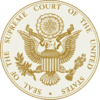United States v. Eichman
| United States v. Eichman | ||||||||
|---|---|---|---|---|---|---|---|---|
 Supreme Court of the United States | ||||||||
| Argued May 14, 1990 Decided June 11, 1990 | ||||||||
| ||||||||
| Holding | ||||||||
| The government's interest in preserving the flag as a symbol did not outweigh the individual right to disparage that symbol through expressive conduct. | ||||||||
| Court membership | ||||||||
| ||||||||
| Case opinions | ||||||||
| ||||||||
| Laws applied | ||||||||
| U.S. Const. Amend. I |
United States v. Eichman, 496 U.S. 310 (1990) was a United States Supreme Court case that invalidated a federal law against flag desecration as violative of free speech under the First Amendment to the Constitution. It was argued together with the case United States v. Haggerty.
The case involved a challenge to the 1989 Flag Protection Act, which forbade the burning or other desecration of the American flag, while allowing for burning as a means of proper disposal of worn or soiled flags. The Act was passed in response to the Court's controversial 1989 decision in Texas v. Johnson, 491 U.S. 397 (1989), which upheld flag burning as an act of protected speech under the First Amendment.
The defendants in Eichman, Shawn Eichman, Dave Blalock and Scott Tyler, had burned an American flag on the steps of the United States Capitol to protest American foreign and domestic policy. Mark Haggerty, in the jointly decided case, had burned a flag in Seattle, Washington.
In a 5-4 decision (with the justices voting the same way the did in Texas v. Johnson), the Court reaffirmed Johnson and struck down the law against flag burning. Brennan stated in the Court's opinion that "Punishing desecration of the flag dilutes the very freedom that makes this emblem so revered, and worth revering."
The defendants were represented by attorneys William Kunstler and David D. Cole.
See also
External links
- US vs. Eichman—full text of the opinion
- First Amendment Library entry on Eichman v. United States
- Street v. New York
- Texas v. Johnson
